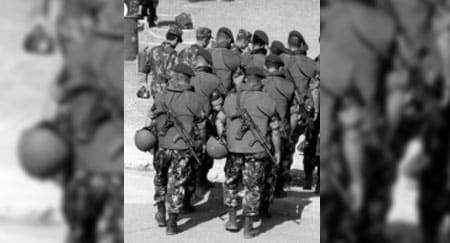An innovative, NATO-sponsored programme is helping recently and soon-to-be discharged officers in Bulgaria and Romania find work and make new lives for themselves outside the military and will soon be extended to Croatia and possibly Albania.
The programme, which was drawn up within the framework of the EU-sponsored Stability Pact for South Eastern Europe, brings together institutions and organisations that have not traditionally worked together, such as NATO and the World Bank, to help tackle deep social problems and contribute to building long-term stability in Southeastern Europe. In total, some 60,000 officers — 20,000 each in Bulgaria, Romania and Croatia — will be beneficiaries and thousands more could benefit if the programme is extended to other countries in the region.
"Both NATO and the World Bank are doing what each organisation does best," says Chuck Parker, coordinator of NATO's South East Europe Initiative. "NATO is helping Partner countries downsize their armed forces and the World Bank is lending some of the money to finance the reforms and help turn soldiers into civilians." Parker, a former US Army colonel, helped devise and develop the programme together with colleagues at the World Bank, Stability Pact and the relevant Bulgarian and Romanian ministries. "NATO and the World Bank are not natural bedfellows, but were able to come together because of the framework provided by the Stability Pact and the resulting synergy is now generating results that can be understood by the man in the street," he says.
After initial discussions in the months following the creation of the Stability Pact in July 1999, NATO despatched teams, including Dutch, German, French and US experts, to Bulgaria and Romania in February and March 2000 to help design the respective programmes. This assistance, combined with NATO's followup monitoring, helped persuade the World Bank to provide the necessary loan financing.
Romania borrowed $500,000 from the World Bank to get its programme off the ground in March of this year and is currently negotiating a further $3 million loan. The Romanian programme, which was drawn up on similar lines to an existing assistance scheme aimed at unemployed miners, is administered by the defence ministry. It brings together several government departments and agencies and operates on a peripatetic basis, visiting military bases, counselling soon-to-be discharged officers to help them get over the shock of redundancy and advising them on their options in civilian life. By September, some 2,000 former military personnel had made use of the programme.
Bulgaria decided not to take the World Bank loan on offer and appealed, instead, for donor-financing. In response, the United Kingdom donated computers and the Netherlands, Norway and the Open Society Institute, the charitable foundation of billionaire philanthropist George Soros, contributed close to $500,000 to get the programme off the ground. It has funding until the end of 2001, the Netherlands has agreed to fund one of four regional centres through 2002, and the programme is looking for additional donations for next year.
The Bulgarian programme differs somewhat from the Romanian. It is administered by a non-governmental organisation, the NGO Resource Centre, which is run by a retired Bulgarian colonel and has established four regional centres. By July of this year, some 2,500 out of about 3,000 discharged officers had visited one of the centres. Some received initial support and set out on their own to find jobs. About 1,000 formally registered or requested that the programme find employment for them. Of these, 200 have found jobs and between 400 and 600 are following leads or preparing for interviews arranged by the programme.
As the Bulgarian and Romanian programmes began to yield results, both Albania and Croatia expressed an interest in launching similar initiatives. Croatian envoys visited Romania to examine how the programme was operating there and get an idea of the preparatory work involved. In March 2001, a NATO team was despatched to Croatia to advise on the next steps.
The Bulgarian and Romanian programmes form part of NATO's South East Europe Initiative, an initiative launched in 1999 in the wake of the Kosovo air campaign to contribute to building stability in Southeastern Europe.

